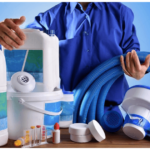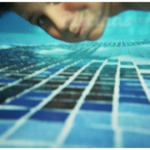Solar floating lights for fiberglass pools are a fascinating and practical option to illuminate your moments of aquatic fun. In this era of sustainability, these lights not only add a magical touch to your pool but are also environmentally friendly and energy-efficient.
Table of Contents
Introduction to Solar Floating Lights
When we talk about solar floating lights, we refer to innovative devices that harness solar energy to illuminate your pool during the night. This not only adds an aesthetic element but also provides an efficient and sustainable solution.
Advantages of Using Solar Floating Lights
The advantages are diverse, from energy efficiency to low maintenance costs. These lights are a smart investment for those seeking a vibrant pool ambiance without compromising sustainability.
- Environmental Sustainability: Solar floating lights operate on solar energy, making them an eco-friendly and sustainable choice. They do not require external electricity or generate greenhouse gas emissions, thus contributing to environmental conservation.
- Energy and Cost Savings: By utilizing solar energy to charge their batteries, solar floating lights help reduce the pool’s electricity consumption, resulting in long-term savings on energy bills.
- Ease of Installation and Use: Solar floating lights are easy to install since they do not require wiring or electrical connection. Simply place them on the water surface and let them charge during the day. Additionally, their automatic operation at dusk makes them user-friendly without manual intervention.
- Versatility and Decoration: These lights come in a variety of designs and colors, allowing you to add a decorative and personalized touch to the pool. In addition to providing functional lighting, they enhance the pool area’s aesthetics, creating a welcoming and attractive environment.
- Safety: Solar floating lights provide an additional source of illumination in the pool at night, improving safety by enhancing visibility for swimmers and preventing potential water accidents.
How Solar Floating Lights Work
The operation of these lights is ingenious. They harness solar energy through integrated solar panels and use sensors to automatically turn on when they detect darkness and water.
- Solar Energy Capture: During the day, the integrated solar panels in the floating light absorb sunlight and convert it into electrical energy. These panels are designed to be highly efficient, even in diffuse light conditions.
- Energy Storage: The generated solar energy is stored in rechargeable batteries inside the floating light. These batteries are low voltage and designed to store enough energy to power the light during the night.
- Automatic Activation at Dusk: Once they detect that sunlight has faded and dusk has begun, the integrated sensors in the floating light automatically activate the illumination. This ensures that the light turns on autonomously without the need for manual intervention.
- LED Lighting: Solar floating lights are typically equipped with low-energy LED lights. These lights provide soft and environmentally friendly illumination that brightens the pool water surface, creating a cozy and safe atmosphere for night swimming.
- Autonomy and Duration: Thanks to energy storage in the batteries, solar floating lights can provide illumination for several hours after dusk, depending on the design and battery capacity. At dawn, the light automatically turns off to conserve stored energy and be ready to charge again during the day.
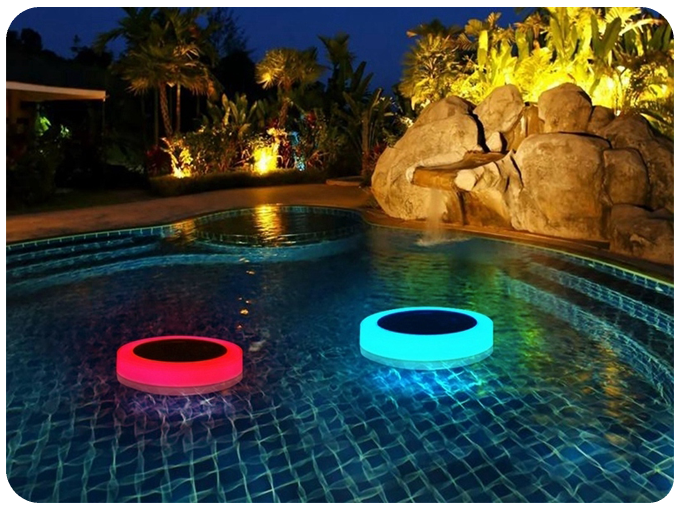
Installation and Maintenance
Installation is easy and quick. Ensure you follow the provided steps and perform regular maintenance to extend the lifespan of your lights.
Installation:
- Placement in the Pool: Place the lights on the pool water surface. Ensure they are evenly distributed to achieve balanced lighting throughout the pool.
- Positioning of Solar Panels: Ensure that the lights’ solar panels are exposed to direct sunlight during the day to ensure adequate battery charging. Place the lights in areas without obstructions that may block sunlight, such as trees or umbrellas.
- Light Sensor Activation: Verify that the light sensors are activated so that the lights automatically turn on at dusk and off at dawn. Some models may have an on/off switch that you should adjust according to your preferences.
Maintenance:
- Regular Cleaning: Periodically clean the solar floating lights to remove any dirt, debris, or buildup that may affect their performance. Use a soft cloth and water to clean the light’s surface and solar panels.
- Check Solar Panels and Batteries: Regularly inspect the solar panels and batteries to ensure they are in good condition and functioning properly. If you find dirt or buildup on the solar panels, gently clean them to ensure optimal charging.
- Battery Replacement (if necessary): If you notice that the solar floating light does not have the same lighting duration as before or seems to be losing power, you may need to replace the batteries. Follow the manufacturer’s instructions to safely and properly replace the batteries.
- Check for Water Tightness: Ensure that the solar floating lights are properly sealed to prevent water from entering inside. If you find any signs of leaks or damage on the housing, repair or replace the light as needed.
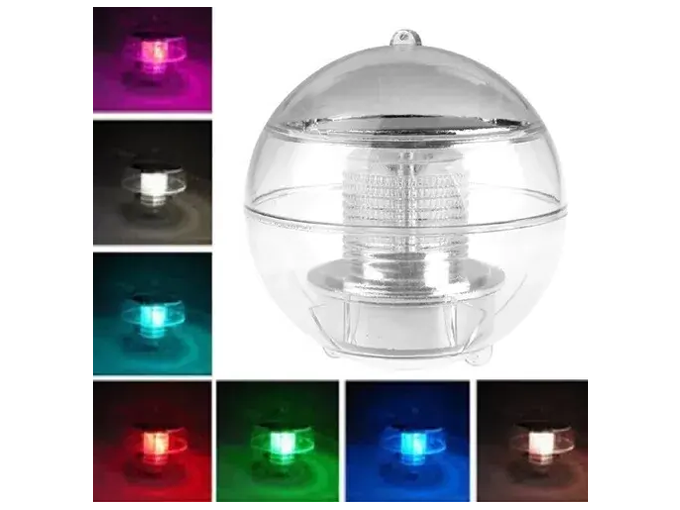
Comparison with Other Pool Lighting Sources
Discover how solar floating lights surpass conventional lighting options and the key differences from electric lights. Solar floating lights excel compared to conventional lighting options like electric lights, thanks to their sustainable operation, easy installation, low operating costs, increased safety, and design versatility. By using solar energy and not requiring electrical connection, these lights offer an eco-friendly and safe alternative to illuminate fiberglass pools, standing out for their mobility, versatile design, and automatic dusk autonomy, making them a practical and efficient choice to create safe and appealing environments during the night.
User Experiences and Testimonials
Read real user experiences of those who have transformed their pools with these lights. Positive feedback reflects the satisfaction of those who have opted for this innovative solution.
Tips to Maximize Performance
Learn about strategic positioning and other additional care to ensure the maximum performance of your solar floating lights.
- Proper Positioning: Place the lights in areas where they receive maximum sunlight exposure during the day. Avoid placing them in shaded or covered areas that may limit solar energy charging.
- Regular Cleaning: Keep the lights and solar panels clean and free of dirt, dust, and debris. Periodically clean the surface of the lights and solar panels to ensure maximum sunlight absorption.
- Optimize Battery Charging: Ensure that the solar floating lights are fully exposed to the sun during the day to properly charge the batteries. Avoid shade and obstacles that may block direct sunlight.
- Adjust Light Sensors: Verify that the light sensors are correctly adjusted to automatically activate the lights at dusk and turn them off at dawn. Adjust the sensors’ sensitivity as needed to optimize their operation.
- Regular Inspection: Conduct regular inspections of the solar floating lights to ensure they are in good condition and functioning correctly. Check the cables, seals, and connections for potential issues and make necessary repairs.
- Turn Off Lights When Not Needed: If there are no swimmers in the pool or no lighting is needed during the night, turn off the solar floating lights to conserve battery energy and extend their lifespan.
Lights as Decorative Elements
Discover how these lights not only illuminate your pool but also become decorative elements, enhancing the aesthetics of your outdoor space.
Economic Considerations When Choosing Solar Floating Lights
Analyze the value-for-money relationship and how the initial investment translates into significant long-term savings. These lights are an economical and environmentally friendly choice.
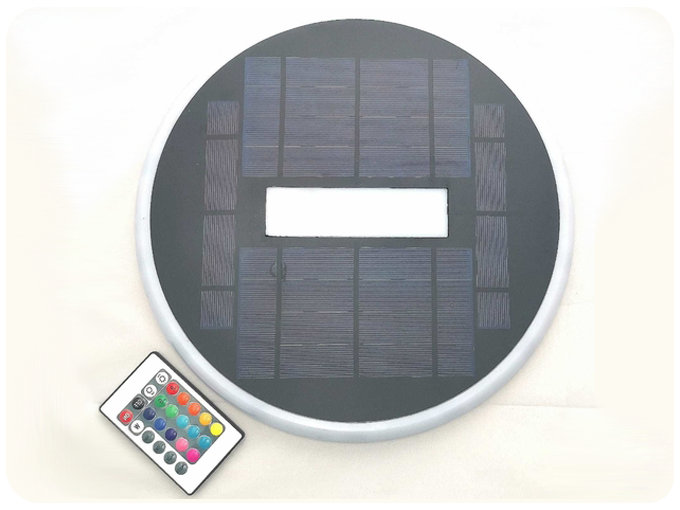
FAQs
- How long do solar floating lights last?
- The lifespan varies, but many have a lifespan of several years with proper maintenance.
- Are solar floating lights safe in the water?
- Yes, they are designed with safety measures and are safe to use in pools.
- Can the designs of the lights be customized?
- Yes, many brands offer customization options to suit your tastes and preferences.
- How much sunlight do they need to fully charge?
- The charging time varies, but under ideal conditions, they can fully charge in a day of sunlight.
- What are the environmental benefits of these lights?
- They contribute to reducing the carbon footprint by using clean and sustainable solar energy.
Final Thoughts on Solar Floating Lights for Fiberglass Pools
In conclusion, solar floating lights are a vibrant and sustainable addition to your fiberglass pool. They not only illuminate your nights charmingly but also contribute positively to the environment. Transform your pool into a luminous and eco-friendly oasis!

